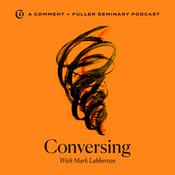When federal agents kill civilians and public outrage sweeps the nation, who gets to define justified force and who gets to hold power accountable? The killings of Renée Good and Alex Pretti have sparked protests, national shutdowns, and fresh debate about what security should look like in America.
Elizabeth Neumann, former assistant secretary for counterterrorism at the US Department of Homeland Security, joins Mark Labberton for a wide-ranging conversation about fear-based governance, moral responsibility, constitutional guardrails, and what faithful leadership looks like in a moment of political crisis.
"Cruelty is a deterrent."
In this episode with Mark Labberton, Neumann reflects on how Christian faith and public service shaped her national security career and why recent forceful immigration enforcement and lethal encounters challenge constitutional limits and moral clarity.
Together they discuss the moral and political meaning of the Minneapolis killings, trauma and vocation, immigration enforcement and democratic consent, fear-driven leadership, and how citizens and faith communities respond when institutions break down.
Episode Highlights
"Cruelty is a deterrent."
"I realized how much my hope and trust had been in man."
"We wrapped the flag around the cross."
"We see sufficiently, but not transparently."
"This is not normal, and this is not okay."
About Elizabeth Neumann
Elizabeth Neumann is a national security expert and former assistant secretary for counterterrorism at the US Department of Homeland Security. She served across three presidential administrations, including senior roles during the George W. Bush and Trump administrations, and worked extensively on counterterrorism, prevention of political violence, and domestic extremism. A frequent public commentator and congressional witness, Neumann has become a leading voice on the moral and constitutional dangers of fear-driven governance. Her work bridges public policy, trauma studies, and Christian ethics, particularly where political power collides with faith commitments. She is the author of Kingdom of Rage, a deeply personal and analytical account of extremism, nationalism, and the cost of unexamined allegiance.
Helpful Links and Resources
Kingdom of Rage: The Rise of Christian Extremism and the Path Back to Peace https://www.amazon.com/Kingdom-Rage-Christian-Extremism-Peace/dp/1546002057
Show Notes
Elizabeth Neumann's experience growing up in North Texas
Faith and party loyalty culturally fused
"To be a Christian meant you were a Republican."
Early fascination with politics and government service
University of Texas, late 1990s political climate
George W. Bush campaigns as formative training ground
Entry into White House work through campaign victory
Faith-based initiatives before September 11 reshaped national priorities
September 11 as lived experience, not abstraction
Crossing the 14th Street Bridge as the attacks unfolded
"We were under attack," and nothing felt safe
Fog, confusion, smoke, radios, and unanswered phone calls
Trauma before resilience, fear before context
Learning endurance from older colleagues who said, "We will get through this."
Trauma as vocational fuel
Hypervigilance, workaholism, and mission-driven identity
National security as moral calling rather than career ambition
Warning from a CIA colleague: rebuild a cadence of normal life
Vigilance versus fear-driven overwork
Marriage, family, and a season of spiritual deepening
Scripture as disruption: Jeremiah 17 and misplaced trust
"I realized how much my hope and trust had been in man."
Public policy confidence challenged as spiritual idolatry
Russell Moore sermon and the shock of naming Christian nationalism
"We wrapped the flag around the cross."
Cultural Christianity exposed as formation, not gospel
Deconstructing politics without deconstructing faith
Becoming comfortable with ambiguity and moral gray
Labberton on seeing "through a glass darkly"
Interpretive humility versus certainty culture
Returning to government during the Trump administration
Saying yes out of mission, not agreement
Guardrails inside government: translating impulse into lawful action
Illegal orders, pressure, and survival mode governance
Lafayette Square as turning point
Peaceful protesters met with militarized force
Optics over constitution
Immigration enforcement reframed as cruelty-based deterrence
"Cruelty is a deterrent."
ICE, CBP, and DHS operating outside traditional norms
First, Second, and Fourth Amendment violations described
Warrantless searches and administrative authority
Law enforcement trained for war zones policing civilian streets
Rapid ICE expansion without vetting or adequate training
Fear rhetoric inside agencies creating enemy mentality
Officers taught to expect violence from the public
Predictable escalation and preventable deaths
Moral injury to agents and terror inflicted on communities
"This is not normal, and this is not okay."
Democracy requires consent of the governed
Public trust collapsing when law breaks the law
Call for stand-down, retraining, and accountability
Faithful resistance as moral clarity, not partisan alignment
#ElizabethNeumann #FaithAndPolitics #NationalSecurity #ImmigrationCrisis #MoralCourage #PublicFaith
Production Credits
Conversing is produced and distributed in partnership with Comment Magazine and Fuller Seminary.



